The push to legalize marijuana across the United States gained speed with new wins in California and elsewhere Nov. 8. But those victories won’t be enough to stop opponents from trying to stop legal pot.
So who are the people that want to kill legalization? How are they using their money...
Big Pharma to Big Booze: Industries Fighting Reform
Tuesday, November 8, 2016
Big Pharma to Big Booze: Industries Fighting Reform
Monday, October 31, 2016
Arkansas Court Kills Legalization Initiative
Voters in Arkansas will have one less path to legalizing medical marijuana use in the November election.
The state Supreme Court in October struck down one of two medicinal cannabis proposals that were slated to appear on the Nov. 8 ballot. The ruling, handed down Oct. 27, means voters will...
Arkansas Court Kills Legalization Initiative
Friday, October 28, 2016
A Few Little-Known Facts About Pot
If you’re a stoner, you know plenty about marijuana. You know how to find it, you know how to use it, and you know how it makes you feel.
But there are plenty of things most people – even most potheads – don’t know about the world’s favorite illicit drug. Here are a...
A Few Little-Known Facts About Pot
Sunday, October 23, 2016
Ad Paints Dark Picture of Legal Marijuana
An anti-marijuana group in Massachusetts is offering voters an especially dystopian perspective on legalization.
The state’s voters will decide Nov. 8 whether they want to make cannabis legal for recreation. If this year’s ballot initiative passes, adults 21 and older would be...
Ad Paints Dark Picture of Legal Marijuana
Friday, October 21, 2016
Legalization Support Reaches 60 Percent
Backing for legalizing marijuana in the United States has reached new levels, according to a poll in October that found the highest levels of support in 57 years.
The poll, released by the Gallup Organization Oct. 19, surveyed 1,017 adults living in all 50 states and the District of Columbia. It...
Legalization Support Reaches 60 Percent
Tuesday, October 18, 2016
700 Pounds of Weed Burned in Colorado
Authorities in rural Colorado burned about 700 pounds of illegal marijuana plants in October, they said.
The plants were burned Oct. 11 in Penrose, in Central Colorado, by officials with the Fremont County Sheriff’s Office. Sheriff Jim Beicker said no criminal charges would be filed...
700 Pounds of Weed Burned in Colorado
Monday, October 17, 2016
The 5 Legalization Battlegrounds of 2016
Nov. 8 is shaping up to be a very big day for marijuana in America. That may be hard to see amid the chaos that is the 2016 presidential race, but five states will decide next month whether they want to legalize the drug.
They include Arizona, California, Maine, Massachusetts, and Nevada. All...
The 5 Legalization Battlegrounds of 2016
Saturday, October 15, 2016
Marijuana Leads to More Arrests Than Violent Crime
Police arrest more people for possession of small amounts of cannabis than they do for all violent crimes combined, a new study reports. The news comes even as states increasingly move toward drug and criminal justice reform and confirms widespread accusations of racial profiling in pot...
Marijuana Leads to More Arrests Than Violent Crime
Where Is Marijuana Legal?
Marijuana law in the United State changes almost by the day. But at least until November 2016, the drug will be legal for personal use in just five places: Oregon, Colorado, Washington State, Alaska, and the District of Columbia.
Each of those places, plus another 33 states, allow medical...
Where Is Marijuana Legal?
Friday, October 14, 2016
Poll Shows Growing Support for Legal Pot
Support for legalizing marijuana has been growing in the United States for decades – and nothing in recent years has slowed that progress, a new poll shows.
The survey, released Oct. 12 by the Pew Research Center, found that almost 60 percent of American adults favor legal cannabis....
Poll Shows Growing Support for Legal Pot
Thursday, October 13, 2016
Is Second Time the Charm for MMJ in Florida?
The last time activists tried to legalize medical marijuana in Florida, it didn’t end well. Voters strongly supported the idea – just not strongly enough.
Florida state law requires a vote of at least 60 percent to amend its constitution by public referendum. Cannabis advocates...
Is Second Time the Charm for MMJ in Florida?
Friday, October 7, 2016
NYC Busts Marijuana Grow
Authorities in New York City busted what they described as a massive marijuana grow in early October.
The raid Oct. 3 uncovered a pot farm in the Bronx that would be relatively small by Colorado or California standards, but city officials said it was sizeable for such a densely populated area....
NYC Busts Marijuana Grow
Thursday, October 6, 2016
Polls: Legalization Ahead in Every State
Marijuana legalization will be on the ballot in five states next month, and the odds are looking increasingly good every one of them could pass it.
Recent polls show voters in each of the five states – Arizona, California, Maine, Massachusetts, and Nevada – support legalization and...
Polls: Legalization Ahead in Every State
Wednesday, October 5, 2016
Denver Cops Are Running Out of Space for Marijuana
Colorado voters legalized marijuana in 2012, a move many said would lead to less illegal cultivation of the drug. But police in Denver now say there’s so much illicit product flooding the market they’re struggling to find space to store what they find.
Officials with the Denver...
Denver Cops Are Running Out of Space for Marijuana
Monday, October 3, 2016
Chelsea Clinton "Misspoke" by Saying Marijuana Kills
Chelsea Clinton admitted she was wrong when she suggested in September that marijuana can kill if it’s mixed with other drugs.
A campaign spokeswoman for the former first daughter said Clinton “misspoke” when she said “anecdotal evidence” shows toxic interactions...
Chelsea Clinton "Misspoke" by Saying Marijuana Kills
Friday, September 30, 2016
Reform Moves East: Maine, Massachusetts to Vote on Legal Weed
The last few years of marijuana reform have revealed at least one curiosity of American geography and politics: It’s much easier to legalize pot in the West than anywhere else.
That, at least, has been the case so far. Four states – Alaska, Colorado, Oregon, and Washington –...
Reform Moves East: Maine, Massachusetts to Vote on Legal Weed
Wednesday, September 28, 2016
Nashville Decriminalizes Marijuana
It is no longer a crime to carry small amounts of marijuana in one of America’s most conservative cities.
Officials in Nashville voted in September to decriminalize simple cannabis possession. Now, instead of facing misdemeanor criminal charges, jail time, and a permanent record, potheads...
Nashville Decriminalizes Marijuana
Monday, September 26, 2016
Coloradans Still Back Legal Weed
Colorado voters legalized recreational marijuana four years ago, and time hasn’t changed their minds.
A poll released in September finds that Coloradans have few regrets in legalizing cannabis in 2012. The results are good news for states voting on the issue in November.
Voters legalized...
Coloradans Still Back Legal Weed
Friday, September 23, 2016
Marijuana Could Cut Opiate Abuse
New research shows a decline in the use of opioid painkillers in US states that allow people to treat pain with medical marijuana, affirming the fears of Big Pharma who have been vigorously seeking to frustrate efforts to legalize the herb.
Columbia University researchers examined data from 1999...
Marijuana Could Cut Opiate Abuse
Monday, September 19, 2016
Michigan Won"t Get to Vote on Marijuana
A federal judge ended hopes that Michigan voters could decide this year whether to legalize marijuana for recreation.
U.S. District Judge Linda Parker rejected a motion for a temporary injunction in September, an injunction that would have blocked state officials from printing ballots until...
Michigan Won"t Get to Vote on Marijuana
Saturday, September 17, 2016
Californians Want to Legalize Marijuana: Poll
California voters will decide Nov. 8 whether they want to legalize marijuana statewide. So far, all signs point to yes.
The odds got even better in September, with the release of a new poll showing continued support for legalization as Election Day approaches. The poll, released Sept. 13 by USC...
Californians Want to Legalize Marijuana: Poll
Friday, September 16, 2016
College Kids Use More MJ, Less Hard Stuff
College students these days use a lot more marijuana than their parents ever did, but a lot less of the hard drugs that plagued the Go-Go ’80s, a new study finds.
Data released Sept. 12 shows that today’s 20-somethings use cannabis at a considerably higher lifetime rate than their...
College Kids Use More MJ, Less Hard Stuff
Sunday, September 11, 2016
Pot Shops Hire Veterans for Protection
Selling marijuana on the legal market is something less than the world’s safest job. A mix of popular drugs, abundant cash, and legal uncertainty leave many pot shops at risk of burglary, robbery, and even murder.
Store owners have a few options: elaborate security measures, bulletproof...
Pot Shops Hire Veterans for Protection
Saturday, September 10, 2016
Nov. 8: The Biggest Day in Marijuana History?
One way or another, Nov. 8 will be a big day for marijuana. Whether reform advances, retreats, or holds its ground, Election Day will reshape the future for medical cannabis patients, recreational tokers, and advocates alike.
But just how important is this election compared to 2012 and 2014,...
Nov. 8: The Biggest Day in Marijuana History?
Thursday, September 8, 2016
New York Loosens Medical Marijuana Rules
Life could soon get at least a bit easier for medical marijuana patients in New York State.
State officials announced in August that they would overhaul medicinal cannabis regulations, allowing home delivery and giving nurse practitioners authority to recommend the drug to qualifying...
New York Loosens Medical Marijuana Rules
Tuesday, September 6, 2016
Marijuana Increasingly Used to Treat Opiate Addiction
Marijuana has long shown promise as an effective painkiller, and that could prove to be a lifesaver – not only for patients who suffer from chronic pain but also for opiate addicts.
Dr. Daniele Piomelli, professor of anatomy and neurobiology at the University of California Irvine School of...
Marijuana Increasingly Used to Treat Opiate Addiction
Monday, September 5, 2016
Does Marijuana Really Cause Laziness? Study Says Yes
If you reject the myth that marijuana makes people lazier, you may be surprised to learn it’s not such a myth, at least according to a new study out of Canada.
The report, released in August by scientists at the University of British Columbia, found that THC, the primary psychoactive...
Does Marijuana Really Cause Laziness? Study Says Yes
Friday, September 2, 2016
Legalization Would Bring California $6.5 Billion
Legalizing marijuana could earn California and its residents more than $6 billion over the next four years according to a report published in August.
If voters opt to legalize the drug in November, as appears increasingly likely, legal cannabis sales could reach $1.6 billion within the first...
Legalization Would Bring California $6.5 Billion
Thursday, September 1, 2016
Busting Some Marijuana Myths
The science of marijuana is fertile ground for myths. Whether it’s misguided beliefs about the physical dangers of smoking cannabis or false assumptions about stoners based on prejudice, urban legends are common and efforts to debunk them never quite get the job done.
That won’t stop...
Busting Some Marijuana Myths
Wednesday, August 31, 2016
Colorado Fights Underage Marijuana Use
Colorado’s Health Department hopes talks from adult role models can help keep kids away from marijuana, and it has launched a new ad campaign with the goal of inspiring those adults to speak up.
The campaign will specifically target what the department calls “trusted adults” — people like parents...
Colorado Fights Underage Marijuana Use
A Stoner"s Guide to Election 2016
Marijuana reform is hugely important to American voters, yet the subject has rarely come up in this year’s presidential contest.
That’s largely because the race has been dominated not by policy discussions but by the personalities of the candidates – specifically the GOP...
A Stoner"s Guide to Election 2016
Tuesday, August 30, 2016
Pain: Does Pot Work Better for Men Than Women?
Gender inequity extends to the cannabis plant, apparently.
A new study suggests marijuana may be more effective at treating chronic or severe pain in men than in women. The study’s conclusions raise important questions about how pot works as medicine and how it can best be tailored to the...
Pain: Does Pot Work Better for Men Than Women?
Jesse Ventura: DEA Is "Just Toying with Us"
It’s easy to forget, but there once was a professional wrestler who governed a state. His name is Jesse Ventura, he won the Minnesota governor’s office 18 years ago this November, and he still pops up in pop culture occasionally.
Most recently Ventura surfaced to scold the DEA for...
Jesse Ventura: DEA Is "Just Toying with Us"
Monday, August 29, 2016
Northern California Blaze Starts with Pot Plants
A large wildfire that burned dozens of homes in Northern California last year started with an illegal marijuana grow, authorities said recently. But two people suspected of sparking it had already fled the United States, the authorities said.
As of Aug. 17 the blaze had destroyed at least 43...
Northern California Blaze Starts with Pot Plants
Actually, Marijuana Can Kill (Sort of)
Libertarian presidential candidate Gary Johnson repeated a common claim about marijuana in August, arguing that it’s far safer than prescription drugs because they kill 100,000 people each year while pot kills none.
But is this true? Is cannabis really fatality free? Well, that depends on...
Actually, Marijuana Can Kill (Sort of)
Friday, August 26, 2016
Court Blocks DEA from MMJ Crackdowns
A landmark court ruling handed down in August blocks the DEA and other law enforcement agencies from spending money to arrest or prosecute people who break federal drug laws but obey state medical marijuana rules.
The ruling by an appeals court based in California enforces legislation passed...
Court Blocks DEA from MMJ Crackdowns
Legal Marijuana Grow Goes Up in Smoke
A legal marijuana garden in Seattle went up in flames in August, destroying a valuable crop and forcing firefighters to work through thick, billowing clouds of pot smoke.
Neighbors called 911, and firefighters found the building engulfed in large clouds of smoke. The smoke was so thick, fire...
Legal Marijuana Grow Goes Up in Smoke
Wednesday, August 24, 2016
DEA Says Marijuana Will Remain Illegal
In a move that should be little surprise to anyone who follows developments in marijuana law, the DEA announced in August that it would not, in fact, make it easier to legalize the drug.
That doesn’t mean it won’t happen. Just a day before the DEA decision, the Obama administration...
DEA Says Marijuana Will Remain Illegal
Tuesday, August 23, 2016
What Does DEA Decision Mean for Future of Reform?
The DEA announced in August that it would not agree to reschedule marijuana as a prohibited drug under the Controlled Substances Act (CSA), a move that makes it harder for states to legalize the drug without fear of a federal crackdown.
But what does the decision mean for the future of cannabis...
What Does DEA Decision Mean for Future of Reform?
Friday, August 19, 2016
Obama Lifts Rules Blocking Marijuana Research
The Obama administration announced in August that it would lift a critical barrier to marijuana research in the United States. The move could eventually pave the way for federal drug policy reforms.
The immediate effect of the decision will be to dramatically increase the supply of cannabis...
Obama Lifts Rules Blocking Marijuana Research
Wednesday, August 17, 2016
Feds Won"t Prosecute Over 1 Gram of Pot
Prosecutors said in August that they would not pursue federal charges against an American Indian man arrested in Oregon for possession of roughly a gram of marijuana.
The state’s voters legalized recreational pot possession in 2014, but because Devontre Thomas, 19, was busted on a...
Feds Won"t Prosecute Over 1 Gram of Pot
Thursday, August 11, 2016
How Do Marijuana, Booze Affect Sex?
It’s no secret that many, many people use marijuana and alcohol to enhance their sexual encounters. Both drugs are widely available, easy to use, and often conducive to romance and physical desire.
But it’s never been clear exactly how pot and booze affect sexual experience, and some...
How Do Marijuana, Booze Affect Sex?
Monday, August 8, 2016
Marijuana Grows Are the New "Meth Houses," DEA Says
The DEA is not exactly known for taking smart positions on drug use and criminal justice reform. So it should come as little surprise that the agency recently compared indoor marijuana gardens to “meth houses.”
Marijuana grow house
Agency officials explained in June that they are...
Marijuana Grows Are the New "Meth Houses," DEA Says
Wednesday, August 3, 2016
Why Trump Would Be Terrible for Legal Marijuana
Marijuana users and drug policy reformers face a difficult choice in November. Neither of the major-party presidential candidates has called for full legalization of the drug, and while there are third parties that openly support the idea, they have no chance of winning the White House.
That may...
Why Trump Would Be Terrible for Legal Marijuana
Sunday, July 31, 2016
Marijuana Sends More Colorado Kids to ER
More children are showing up in Colorado emergency rooms after accidentally consuming legal marijuana, according to a new study.
The number of cases reported to the state’s poison control network, as well as the number of kids checking into ERs, has spiked in the years since the first...
Marijuana Sends More Colorado Kids to ER
Florida Gets Its First Medical Marijuana Shop
Florida is the third-most populous state in the country, so it’s no small deal that the state got its first medical marijuana dispensary in July.
The first legal medicinal pot shop opened in a Tallahassee strip mall July 26, and the store sold its first batch of cannabis to Dallas Nagy,...
Florida Gets Its First Medical Marijuana Shop
Reduced Marijuana Penalties in Kansas
Although it may seem hard to believe, the statutory penalties for possession of marijuana
went down in Kansas effective July 1, 2016. It is still illegal and can still put you in jail for a
substantial period of time, but it is a step in the right direction.
Section 1 of House Bill 2462 amending...
Reduced Marijuana Penalties in Kansas
$15 Million Pot Trafficking Ring Busted
Authorities in New York said they broke up a major marijuana-smuggling ring that shipped $15 million worth of the drug from California over the last two years.
The cannabis was trafficked once a month in shipments of roughly 350 pounds each, prosecutors said. The operation allegedly started in...
$15 Million Pot Trafficking Ring Busted
Thursday, July 28, 2016
California Cops Fired for Nibbling on Weed During Raid
Three Southern California police officers were fired for stealing cannabis edibles during a raid on a medical marijuana dispensary last year.
Santa Ana officers Brandon Matthew Sontag, Nicole Lynn Quijas, and Jorge Arroyo lost their jobs with the city’s police department after pleading...
California Cops Fired for Nibbling on Weed During Raid
Thursday, July 21, 2016
Colorado Sanctions Doctors Over MJ Recommendations
Colorado officials suspended the licenses of four doctors for allegedly recommending that 1,500 medical marijuana patients be allowed to grow excessive numbers of pot plants.
The move represented the biggest disciplinary action against doctors who recommend medical cannabis to Colorado patients....
Colorado Sanctions Doctors Over MJ Recommendations
Wednesday, July 20, 2016
Senators Move Against Synthetic Marijuana
The scourge of K2 and other forms of synthetic marijuana is drawing increased attention from Congress.
In July, Sen. Chuck Schumer, a New York Democrat, sponsored a bill that would prohibit more than 20 chemicals used to make synthetic pot, also known by K2, Spice, and other unofficial...
Senators Move Against Synthetic Marijuana
Wednesday, July 13, 2016
Democrats Push for Marijuana Reform, GOP Rejects It
Americans have never been more united in their support for marijuana policy reform, yet the two major political parties have never been further apart.
The Democratic National Committee voted in July to push for a “reasoned pathway” to nationwide legalization of cannabis. The GOP,...
Democrats Push for Marijuana Reform, GOP Rejects It
Wednesday, July 6, 2016
The Feds Could Legalize Marijuana in Days, but They Won"t
The DEA plans to make what could be a landmark announcement by the end of July: whether the government will reclassify marijuana under federal law, making it easier for states to legalize the drug.
DEA officials said this spring that they would tell lawmakers by August whether they will...
The Feds Could Legalize Marijuana in Days, but They Won"t
Tuesday, July 5, 2016
Massive Pot Farm Discovered in Texas
Game wardens uncovered a massive, multi-million dollar marijuana farm in Texas in late June, leading authorities to uproot tens of thousands of plants. No arrests were made as of early July.
A group of wardens from the Texas Parks & Wildlife Department were conducting an aerial patrol over ...
Massive Pot Farm Discovered in Texas
Saturday, June 25, 2016
So You"ve Been Arrested: Should You Get a Lawyer?
An arrest for a simple marijuana crime may not seem like a big deal – after all, who really cares that you enjoy smoking a plant that grows in the ground?
Well, police and prosecutors do, at least in places that haven’t legalized or decriminalized cannabis. Even in states with...
So You"ve Been Arrested: Should You Get a Lawyer?
Friday, June 24, 2016
Oregon Q & A: What"s Legal There?
Retail marijuana has been available in Oregon since voters legalized the drug in November 2014, but otherwise life hasn’t changed all that much. Northwest potheads are still Northwest potheads, and pot is still easy to find pretty much everywhere.
Still, the little differences matter. Few...
Oregon Q & A: What"s Legal There?
Wednesday, June 22, 2016
DEA Could Reschedule Marijuana - Or Not
Depending on whom you believe, the DEA is on the verge of rescheduling marijuana under the Controlled Substances Act, a move that would open the door to widespread medical cannabis and even full legalization.
Or not.
The federal anti-drug agency sent a letter to several members of Congress this...
DEA Could Reschedule Marijuana - Or Not
California Hash Oil Firm Back in Business After Raid
A California medical marijuana business is back on its feet after police tried to shut it down – and the owner’s resistance could demonstrate the growing clout of the legal pot industry.
Care by Design, a Santa Rosa-based medicinal cannabis company, was shuttered briefly in June...
California Hash Oil Firm Back in Business After Raid
Tuesday, June 21, 2016
Legalization Hasn"t Led to More Teen Toking in Colorado
Colorado voters legalized marijuana in 2012 amid dire warnings their decision would let loose a wave of teenage potheads. A new study finds that hasn’t come to pass.
One in five Colorado adolescents say they’ve used cannabis within the last month, according to a report from the state...
Legalization Hasn"t Led to More Teen Toking in Colorado
Thursday, June 2, 2016
Portland Pot Giveaways Coming to an End
Marijuana is everywhere in Oregon these days – and a fair amount of it is going for free.
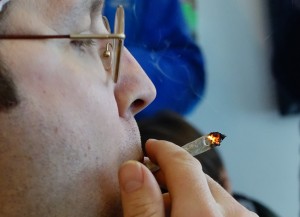 That’s something local officials are trying to stop, mostly by way of educating those who have been giving all the pot to fellow stoners. Above all, they’re trying to stress the rule that a sale is a sale, no matter how cleverly structured.
That’s something local officials are trying to stop, mostly by way of educating those who have been giving all the pot to fellow stoners. Above all, they’re trying to stress the rule that a sale is a sale, no matter how cleverly structured.
The confusion arises from a fact many in the legal cannabis industry view as a term of art: Oregon’s young marijuana laws ban unlicensed “sale” of the drug but allow “gifting” of small amounts. As long as no money or other form of “consideration” changes hands, gifts are kosher.
Oregon’s vague gifting laws
But this rule is complicated by the fact that almost anything of value qualifies as “consideration.” Officials say that means collecting a cover charge for a band and then “giving” cannabis away as part of the deal is illegal. Officials say it evades licensing requirements, regulations, and sales taxes, among other problems.
The crackdown is being felt mostly in Portland, where giveaways have been a big deal since the end of prohibition in November 2014. Singer-songwriter Justin Townes Earl hosted such an event earlier in 2016, where guests paid to hear him – and hosts handed out two joints per person.
“We’re not selling anything. As far as I’m concerned, they’re private events — all the money goes to the entertainment — sponsored by my company but basically put on by my wife and myself” said Richard Vinal, the operations director for HiFi Farms. “I really do at this point view it as like a barbecue.”
Gifting permitted up to one ounce
State law allows the gifting of up to one ounce per person, but officials say the Earl event is not the way it’s supposed to work. That means HiFi will have to abandon plans for future giveaways.
“I work with many clients and organizations that would like to put on events, and everybody has hit the pause button until we understand how those events can be produced or if they can even be produced,” said Amy Margolis, executive director of the Oregon Cannabis Association. “It’s hard to say it’s a change in policy because the City of Portland’s policy is just really being created. So there are two moving pieces. One is, what can producers, processors, dispensaries, how are they allowed to interact with these events? And the city of Portland issue is, can these events happen at all?”
Any exchange constitutes a sale
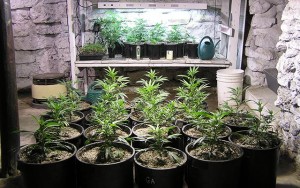 Specifically, Portland authorities say any exchange of money in which marijuana is consideration – in which it’s part of the bargain, in other words – counts as a sale, not a gift. And gifts may only be transferred to medical marijuana patients or to medicinal dispensaries. In other words, the drug cannot be given from a private supply straight to a recreational user.
Specifically, Portland authorities say any exchange of money in which marijuana is consideration – in which it’s part of the bargain, in other words – counts as a sale, not a gift. And gifts may only be transferred to medical marijuana patients or to medicinal dispensaries. In other words, the drug cannot be given from a private supply straight to a recreational user.
That means that if HiFi wants to give away cannabis, the farm will have to sell it to a dispensary first and then buy it back at a markup, plus sales tax.
Portland officials also made clear in May that they have no plans to tolerate big marijuana giveaways this summer as they have in the past. The events have become a common sight in pot-friendly parts of the city.
Asked why this summer would be different, Brandon Goldner, the city’s marijuana policy program assistant, pointed to greater resources now that retail marijuana has been available for more than a year.
“We now have the staff in order to enforce the code a little more fully than we were before, I guess that’s the short answer on that,” Goldner said.
Portland Pot Giveaways Coming to an End
Monday, May 30, 2016
Toronto Shuts Dozens of Medical Marijuana Dispensaries
Canada may legalize marijuana next year, but authorities aren’t going light on dispensaries that sell the drug in the meantime.
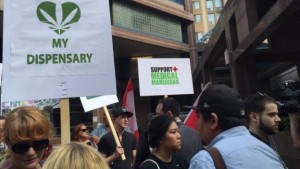 Longtime cannabis activists complained after police in Toronto shuttered dozens of medical marijuana shops officials said were operating illegally and arrested nearly 100 people. The drug is legal for medical use anywhere in the country, but only licensed businesses are allowed to grow and sell it.
Longtime cannabis activists complained after police in Toronto shuttered dozens of medical marijuana shops officials said were operating illegally and arrested nearly 100 people. The drug is legal for medical use anywhere in the country, but only licensed businesses are allowed to grow and sell it.
Still, reformers noted the raids were a waste of police time, money, and other resources. Law enforcement authorities closed 43 Toronto stores and made 90 arrests, according to the BBC.
Canada set to legalize marijuana nationwide in 2017
The country is rapidly heading toward full legalization: The Liberal government of Prime Minister Justin Trudeau promised after the party’s landslide win last year that Parliament would make pot legal for recreational use by all adults.
Reform advocates gathered outside Toronto police headquarters after the busts in May, saying the closed shops were an essential part of medical marijuana access in Canada’s largest city. Protesters carried signs that read “Save Our Dispensaries” and “Bad Laws, Bad Cops.”
Cracking down on dispensaries selling for recreation
Police Chief Mark Saunders announced the raids during a news conference at which he was heckled by protesters. He said the crackdown was focused on unlicensed businesses believed to be selling cannabis for recreation.
Saunders said the shops were part of a total of 83 known to be operating in the city without retail licenses. The raids resulted from “significant complaints” from neighbors and other community members, he said. The busts netted 270 kilograms of marijuana bud and a large number of edibles.
Mislabelled products
Among other violations, Saunders said, the targeted stores were selling products with “inaccurate information” about THC content, something he called a “genuine health concern.”
“It’s a danger that you don’t know where the [pot] is coming from,” he said.
Canada’s medical marijuana system is complicated, making it difficult for dispensaries to operate above-board. The drug is legal for adult medical use nationwide, thanks to a court ruling from the early 2000s, but the country’s health department, Health Canada, only licenses certain vendors that ship their product – often sub-quality – by mail.
Limited MMJ licenses
 “Knowingly selling without a license issued by Health Canada is unlawful,” Saunders said following the raids. “You can’t be doing it.”
“Knowingly selling without a license issued by Health Canada is unlawful,” Saunders said following the raids. “You can’t be doing it.”
That means dispensaries like the ones in Toronto may all technically be illegal. And the gray area may not have a resolution until cannabis is legalized completely, something Trudeau has promised will happen in 2017.
Canada is on track to become the first major world power to legalize marijuana for recreational use. Uruguay has already done so, as have four U.S. States and the District of Columbia, but no leading country has yet legalized.
Protesters at the May news conference demanded that Saunders explain the raids in light of the likelihood marijuana will soon be legal. “Where are the victims?” one protester shouted.
“I don’t want to disrupt anyone getting legal access to medical marijuana,” Saunders said. “You keep asking questions, but you don’t really want answers.”
Toronto Shuts Dozens of Medical Marijuana Dispensaries
Saturday, May 28, 2016
Marijuana Increasingly Popular for PTSD in Veterans
It’s no secret marijuana is useful in treating the symptoms of post-traumatic stress disorder (PTSD). The drug can ease anxiety, reduce negative memories, and prevent the onset of depression.
 No one knows this better than America’s military veterans. As a growing number of states consider adding PTSD to the lists of conditions that qualify for medical cannabis, many vets say there’s no need for debate.
No one knows this better than America’s military veterans. As a growing number of states consider adding PTSD to the lists of conditions that qualify for medical cannabis, many vets say there’s no need for debate.
That’s because more of them are already using the drug to treat their symptoms, even in states where it is illegal for any use and in states where medical marijuana is allowed, but not for PTSD.
Marijuana has yet to win the endorsement of the U.S. Department of Veterans Affairs, which claims there are no large studies proving its efficacy in treating the trauma-induced condition. But many former members of the military say cannabis alleviates their anxiety, sleeplessness, and flashback nightmares.
Marijuana is superior alternative to traditional medications
At the same time, they say, traditional medications, specifically SSRI antidepressants and benzodiazepines such as Xanax and Klonopin, don’t do much good. Even when they do, they leave many vets feeling zonked out.
“I went from being an anxious mess to numbing myself with the pills they were giving me,” said Mike Whiter, a 39-year-old Marine Corps veteran from Pennsylvania. “Cannabis helped me get out of the hole I was in. I started to talk to people and get over my social anxiety.”
Some experts dispute this, saying a troubling number of vets become “addicted” to cannabis, despite voluminous evidence that such dependence is rare. Officials at the VA are also falsely implying marijuana use causes other mental illnesses, such as bipolar disorder. That is impossible: Bipolar disorder is caused mostly by genes and almost always appears by early adulthood, not years after combat experiences.
More states likely to include PTSD in MMJ list of qualifying conditions
 These kind of false claims are unlikely to stop the advance of cannabis in treating PTSD, though. Ten states have already declared the disorder to be a qualifying condition for medical marijuana, and more are likely to follow.
These kind of false claims are unlikely to stop the advance of cannabis in treating PTSD, though. Ten states have already declared the disorder to be a qualifying condition for medical marijuana, and more are likely to follow.
The scientific evidence is somewhat split, at least in the eyes of cannabis opponents. Some studies have shown the drug is helpful to people who suffer from symptoms of trauma, while one suggested it could make the disorder worse.
Georgia, Illinois, New Hampshire, New Jersey, Pennsylvania, Rhode Island, and Utah are debating whether to add PTSD to their qualifying lists. And the U.S. Senate adopted a law in November that would allow doctors at the VA to recommend marijuana to veterans in states that allow it. But the House rejected the bill.
It isn’t absolutely certain marijuana is widely effective in treating PTSD, but most of the pushback comes from politicians and doctors who oppose cannabis for any use. “Cannabis use disorder,” the term for addiction to the drug, affects less than 10 percent of users and is almost never considered severe.
Many doctors and vets firmly disagree with the opposition. The drug is highly effective, they say, and doctors can give patients guidance so their cannabis use doesn’t become a problem. And weed can help veterans open up in therapy, something that could make a big difference in their recovery.
Marijuana Increasingly Popular for PTSD in Veterans
Friday, May 27, 2016
Cops Raid Illegal Colorado Grow Sites
Federal agents joined with state and local police to raid what they said were illegal marijuana grows in eastern Colorado in April.
Law enforcement served search warrants at more than two dozen sites in a region stretching from Colorado Springs to Denver. The raids were all related, according to the Denver Post, and a spokesman for the DEA acknowledged several arrests but declined to offer more specifics about the busts.
The spokesman said a cross-Colorado police task force led the raids. The Colorado attorney general’s office will prosecute the unnamed defendants, according to the DEA and officials with the task force.
The warrants were sealed, meaning reporters had no access to details of the operation. Search warrants typically are treated as public documents, and affidavits attached to them include information about why courts issue them.
30 sites searched
A spokeswoman for the El Paso County Sheriff’s Office confirmed her agency was involved and helped federal agents serve the warrants. They were served at multiple locations, she said, but she wouldn’t say what agents were looking for. A source told the Post officers searched roughly 30 sites.
The raids, though unexplained, were likely part of a statewide effort to stop farmers who grow marijuana illegally and then ship it to other parts of the country. U.S. Attorney John Walsh told reporters he wants to ensure Colorado doesn’t grow and export cannabis like a large portion of Northern California.
“We are working very hard to make sure Colorado doesn’t assume a similar role in the marijuana trade,” Walsh said. The number of cases connected to that effort is growing, he said.
Larger grows require special licences
Adults in Colorado can legally grow up to six cannabis plants at home as long as the cultivation is confined to an “enclosed, locked space.” But larger grows are illegal unless they are licensed by the state. And some local governments have limited the legal number of plants at a single home or placed zoning restrictions on home gardens.
The smell of illegal plants is typically what draws the attention of police, said Brian Ruden, owner of a chain of Denver pot shops.
“Even one plant, if it’s near the end of its flowering cycle, and you’re not using odor control, you can smell it,” Ruden said.
At least one of the sites raided in April was located in the Denver area, and neighbors said the cannabis odor lingered long after several men were arrested at the house. Police dug up a large number of plants and stacked them on the sidewalk.
Next door neighbor Joshua Bower said he heard loud bangs coming from the house about 5 a.m. April 14, followed by a large number of officers breaking through the door. They proceeded to dig up cannabis plants and haul them to the sidewalk. Bower said he knew marijuana was grown at the house but had no idea it was planted in commercial quantities.
“I definitely didn’t know it was at that level,” he said. “You could smell it.”
—
Leave a comment: Are police and federal agents doing the right thing by cracking down on illicit grows in Colorado? Why?
Cops Raid Illegal Colorado Grow Sites
Tuesday, May 17, 2016
Veteran: Kansas Took My Kids Because of Medical Marijuana
A Kansas military veteran whose five children were seized by child services says the state took them because he uses medical marijuana to treat PTSD – not because of domestic and legal troubles.

Raymond Schwab, a 40-year-old Navy veteran, told reporters in March that workers at the Kansas Department of Families and Children, an agency frequently accused of taking kids for their parents’ medical cannabis use, falsely claimed they acted because of recent scrapes with police.
Agency workers took the children – ages 5, 7, 11, 13, and 16 – in April 2015. Schwab accused the state of “illegally kidnapping” them after his mother-in-law told police they had been abandoned. The agency acted as he was preparing to move to Colorado so he could legally use medical pot, he said.
Kansas’ harsh anti-cannabis laws
Marijuana is legal for any use in Colorado, including medical, while it is outlawed in Kansas. Anti-cannabis laws there are especially harsh, and the Department of Families and Children has a history of removing children whose parents use the drug.
But officials insist that’s not why they took Schwab’s kids. They said they couldn’t comment on specifics, but said he isn’t telling the truth about what happened.
In fact, no specific reason has been offered by any state official. But Schwab says it’s not because of recent legal incidents involving him and his wife.
In the months leading up to the removal, Schwab’s wife, Amelia, was arrested after she assaulted him at a strip club; police responded to a domestic disturbance at their home; and Amelia Schwab was hospitalized for mental health concerns, according to The Associated Press.
“None of those things were in the state’s allegation,” said Schwab, who continues to protest the state’s actions. But cannabis was mentioned, he said, and he was told to abstain from the drug for at least four months before Kansas would return his children.
Schwab has repeatedly protested outside the Kansas Statehouse in Topeka, and said he ended a two-week hunger strike in late March.
Federal lawsuit filed against Kansas state
 In the meantime, Matthew Pappas, a California medical marijuana lawyer, traveled to Topeka and said he would file a federal lawsuit seeking the children’s return. Pappas joined a small rally in Topeka after arriving, and Schwab said he plans to continue protesting for at least another month.
In the meantime, Matthew Pappas, a California medical marijuana lawyer, traveled to Topeka and said he would file a federal lawsuit seeking the children’s return. Pappas joined a small rally in Topeka after arriving, and Schwab said he plans to continue protesting for at least another month.
Pappas said he had seen the transcript of the allegations against the Schwabs. Of the family’s legal scrapes, he said, “If they played a role in what’s going on in court, they would be in the transcript, but they’re not.”
Schwab said he developed post-traumatic stress disorder after serving 18 months in the Navy between 1994 and 1996. He has declined to discuss what happened during his service, but said he came back with chronic joint and back problems, got hooked on opiate pain pills, and eventually moved on to heroin.
Marijuana helped him leave that addiction behind, he said. He moved to Kansas from Colorado in 2013 to work for the Veterans Administration. He and his wife have run into trouble several times since.
Last year Amelia Schwab pleaded guilty to domestic battery following a 2014 incident in which she attacked her husband at a Topeka strip club. Raymond Schwab said his marriage was falling apart at the time and he had relapsed into drinking.
A domestic disturbance in January 2015 was followed by Amelia Schwab’s hospitalization. Officials took the children while she was in the hospital, after her mother alleged they had been abandoned. Also in 2015, Raymond Schwab was charged with trespass and battery after allegedly breaking into an apartment above the strip club.
—
What do you think? Is Schwab telling the truth? Did he deserve to lose his kids? Post a comment below.
Veteran: Kansas Took My Kids Because of Medical Marijuana
Tuesday, May 10, 2016
Gary Johnson: I Used Marijuana - This Month
It’s de rigueur these days for presidential candidates to admit they used marijuana in their youths. Hell, President Barack Obama belonged to a “choom gang” and even acknowledged he dabbled in cocaine. And no one cared.
 But some politicians don’t have to look back to childhood to peg the last time they smoked up. Former New Mexico Gov. and lifelong pothead Gary Johnson, for instance.
But some politicians don’t have to look back to childhood to peg the last time they smoked up. Former New Mexico Gov. and lifelong pothead Gary Johnson, for instance.
Johnson, who is seeking the presidential nomination of the Libertarian Party for the second time, told reporters in March he used cannabis within the past two weeks.
“But it wasn’t smoking it,” he said. “It was edibles.”
The governor’s THC treat came in the form of Cheeba Chews, a wildly popular chocolate/fudge taffy full of marijuana. Standard doses are measured at 10 milligrams of THC, though Cheebas can be found in concentrations of up to 1,000 milligrams per chew.
Johnson is no stranger to cannabis or drug policy reform. In 1999, he was the first U.S. governor to call for full legalization, and so far the last. And he was once the CEO of a publicly traded marijuana company, Cannabis Sativa Inc.
But he said he uses responsibly, and not all that often, noting that he uses it “occasionally.” He also said marijuana has kept him away from alcohol: “I haven’t had a drink of alcohol in 29 years.”
“For me, when I smoked marijuana when I was 17 years old for the first time, the first takeaway was, ‘Holy cow, this is so much better than alcohol!"” he said. “There just doesn’t seem to be a downside.”
The promise of cannabis as a much healthier substitute for alcohol played a big role in the push to legalize the drug in Colorado, and Johnson said it could be critical in the campaign to legalize under federal law.
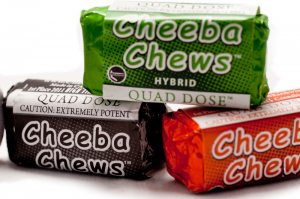 But, he said, “There’s a downside to doing anything all the time.”
But, he said, “There’s a downside to doing anything all the time.”
Johnson left his post at Cannabis Sativa in January so he could pursue the Libertarian nomination. It’s his second run: He won the nod in 2012 and ultimately pulled in nearly 1 percent of the national vote, better than all other minor-party candidates combined.
Johnson said he’s proud to know he’ll have an impact on drug policy reform for years to come, both from his two terms as governor and from his time at the helm of Cannabis Sativa. He also touted the company’s products, including a sativa lozenge that delivers “as good a marijuana high as exists on the planet,” he said. “We can’t legally produce it anywhere (else), because it’s strain specific.”
He predicted his role in creating the lozenge would add to his legacy as a cannabis entrepreneur and reform advocate. The lozenge is sold under the brand name “Hi,” and joins a long list of marijuana edibles sold in New Mexico and other states where the drug is legal for recreation or medicine.
“I was directly responsible for bringing the ‘Hi’ brand,” Johnson said. “Two hundred years from now, this Sativa lozenge will exist under the brand name Hi.”
The former governor has used his place in the Libertarian Party to push for continued legalization across the country. With rare exceptions, third parties do poorly in American elections, but growing divisions in the Republican Party could send more voters Johnson’s way.
—
We want to know: Would you be willing to vote for a minor-party candidate who favors legalization? What if you knew he couldn’t win?
Gary Johnson: I Used Marijuana - This Month
Pennsylvania Joins the Medical Marijuana Crowd
Add one more to the list. Pennsylvania lawmakers moved in April to make the state the 24th to allow medical marijuana.
 The state House of Representatives voted 149-46 to send a medical cannabis bill to the desk of Democratic Gov. Tom Wolf, who was expected to sign it. The vote came after years of pleading from sick patients and the parents of epileptic children, and it followed action by the Senate nearly three years ago.
The state House of Representatives voted 149-46 to send a medical cannabis bill to the desk of Democratic Gov. Tom Wolf, who was expected to sign it. The vote came after years of pleading from sick patients and the parents of epileptic children, and it followed action by the Senate nearly three years ago.
The law will permit so-called “whole plant” cultivation and use of marijuana, including portions of the plant containing THC. This is the chemical that gets users high, and it is helpful in treating a multitude of health problems.
But the vote was driven by a concerted campaign to make CBD, another chemical in marijuana, available to children with intractable seizure disorders. CBD is non-intoxicating, a factor that has pushed many conservative states to legalize only that portion of the cannabis plant.
Whole-plant medical marijuana
Reformers in Pennsylvania were able to legalize the more comprehensive chemical approach despite intense opposition from the Pennsylvania Medical Association and other conservative groups. Doctors in many other states are supportive of medical marijuana laws.
Parents behind the Pennsylvania campaign said they had already been forced to wait far too long.
“Every day we roll the dice on our child’s or our loved one’s life,” said Christine Brann of Hummelstown, Pa., whose 5-year-old son, Garrett, suffers from Dravet syndrome, a rare and severe form of pediatric epilepsy.
Patients will be banned from smoking the drug
But the law won’t make everyone happy. As in Minnesota and New York, Pennsylvania lawmakers barred patients from smoking marijuana. Instead they will have to vaporize it, eat it, or take it in pill form, methods that are often less effective. Home grows will be prohibited.
Resistance from the usual conservative corners was fierce, delaying progress for years. Republican state Rep. Matt Baker, who voted against the bill, insisted it violates federal anti-drug laws, a claim often pushed by reform opponents.
“There’s serious consequences associated with this monumental piece of legislation,” Baker said during debate in the House.
Long list of qualifying conditions
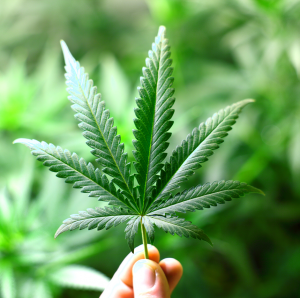 The new law will clear marijuana as treatment for 17 qualifying conditions, including cancer, AIDS, epilepsy, Parkinson’s disease, autism, PTSD, multiple sclerosis, sickle cell anemia, and glaucoma.
The new law will clear marijuana as treatment for 17 qualifying conditions, including cancer, AIDS, epilepsy, Parkinson’s disease, autism, PTSD, multiple sclerosis, sickle cell anemia, and glaucoma.
Patients will have to register with the state Department of Health to get medical marijuana ID cards, and doctors will be required to obtain certification before formally recommending the drug to patients.
The first recommendations likely won’t be written for at least two years, lawmakers said. Parents of epileptic children will be allowed to buy CBD cannabis from other states in the meantime, but bringing it back to Pennsylvania would be a federal crime, forcing the children to use it elsewhere – an unworkable solution for most.
Cara Salemme, whose 9-year-old son experiences multiple life-threatening seizures every day, said she and other parents like her wouldn’t wait for the state to sort out the niceties before getting medical cannabis for their children.
“There are many people in Pennsylvania who aren’t waiting,” Salemme said. “They’re healing.”
—
Leave a comment: Why does it take so long for “liberal” states such as Pennsylvania to adopt medical marijuana laws?
Pennsylvania Joins the Medical Marijuana Crowd
Ohio Could Get Medical Marijuana Soon
Less than a year after marijuana reform suffered a stinging defeat in Ohio, lawmakers have unveiled a plan to legalize the drug as medicine by 2018.
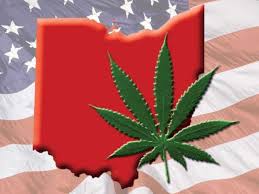 Legislation was introduced in April that would allow patients aged 18 and up to buy, possess, and use marijuana with a doctor’s recommendation. If it passes, the new law would cover edibles, oils, and THC patches – and possibly smokeable cannabis.
Legislation was introduced in April that would allow patients aged 18 and up to buy, possess, and use marijuana with a doctor’s recommendation. If it passes, the new law would cover edibles, oils, and THC patches – and possibly smokeable cannabis.
The bill would create a state commission that would, in turn, create rules for how to grow, distribute, and sell the drug to patients. The process could take less than two years, said Republican state Rep. Kirk Schuring, who led the task force behind the legislation.
Gov. John Kasich, also a Republican, has already promised to sign “something” that provides medical marijuana to legitimate patients. Kasich could receive the bill over the summer, roughly the time his quixotic bid for the GOP presidential nomination will end.
The proposed law would grant adult patients with qualifying conditions permission to use cannabis as treatment. But it also would make a non-intoxicating form of the drug available to children with intractable epilepsy.
Home cultivation would be banned
Home grows would remain illegal, however, and lawmakers have yet to decide whether patients could smoke the drug. Several other states, including neighboring Pennsylvania, prohibit toking and require that patients vaporize the drug, eat it, or take it in pill form. Ohio would also allow transdermal patches.
Only doctors certified by the marijuana commission could recommend pot to patients, but the state would not limit the list of qualifying conditions. Instead, physicians would be given limited discretion in how they recommend the drug, and would have to submit an explanation of each recommendation every 90 days.
The bill would give local governments the power to ban dispensaries, an approach that has caused problems in other states. Lawmakers would also decide whether to tax the drug; prescription drugs regulated by the FDA are tax-free.
Critically, the bill would protect banks that opt to work with the medical marijuana industry. But that protection would not cover federal banking laws that currently discourage such financial relationships.
Reschedule marijuana to allow research
 If the plan passes, Ohio would encourage the federal government to reschedule cannabis under the Controlled Substances Act, making it easier to research and legalize the drug. But employers could continue to fire workers who use it, even as medicine.
If the plan passes, Ohio would encourage the federal government to reschedule cannabis under the Controlled Substances Act, making it easier to research and legalize the drug. But employers could continue to fire workers who use it, even as medicine.
“The workplace can still be drug-free,” Schuring said. “Employers do not have to make accommodations for employees being recommended medical marijuana.”
Ohio voters killed an earlier proposal to legalize medical marijuana in November. That initiative also would have allowed pot for recreational use, but it died at the ballot box after voters turned on provisions that would have granted monopoly power to a small group of growers.
The new legislation was filed in the state House of Representatives. The Senate likely will wait until the House votes before acting, but senators will have their own concerns, said state Senate President Keith Faber.
“Does it include smokeable or not?” Fabre said. “Are we creating a database, just like we do with opiates? How are we going to allow the prescription? How many dispensaries are we going to have? Are we going to limit the production side? How are we going to award the licenses? Is it going to be a monopoly? All of those are questions that we have concerns about.”
—
Tell us below: How long do you think it will take to legalize medical marijuana in Ohio? What about legalizing for recreational use?
Ohio Could Get Medical Marijuana Soon
DEA Clears PTSD Marijuana Study
A new study will attempt to determine whether marijuana is useful in treating the symptoms of post-traumatic stress disorder, also known as PTSD.
 The DEA cleared the way in April for a clinical trial that will examine whether traditional smoked cannabis can effectively treat the mental disorder, which is caused by profoundly traumatic experiences. The placebo-controlled study is the result of nearly 10 years worth of campaigning by researchers in three states.
The DEA cleared the way in April for a clinical trial that will examine whether traditional smoked cannabis can effectively treat the mental disorder, which is caused by profoundly traumatic experiences. The placebo-controlled study is the result of nearly 10 years worth of campaigning by researchers in three states.
“Mostly we’re just grateful that we get to see science move forward,” said Dr. Sue Sisley, one of the leaders of the trial.
The project will start as early as May and will enroll 76 combat veterans at clinics in Arizona and Maryland. The subjects will smoke different marijuana strains of varying potency to gauge how the drug affects the emotional and medical problems caused by PTSD.
A life-altering condition
The illness, which can be triggered by combat, sexual assault, child abuse, and other forms of severe trauma, has a wide range of potential symptoms. Nightmares, flashbacks, jumpiness, and intense anxiety are among them. PTSD comes in multiple forms and degrees of severity, but for most patients it is life-altering.
Whatever the study ultimately determines, conducting it is a scientific necessity, Sisley said. As the full scope of PTSD and its impact on veterans becomes more apparent, patients deserve to know about potential treatments, she said.
“The study needs to happen because these veterans have legitimate questions,” she said.
Sisley has been in the news before. She lost her previous job at the University of Arizona in 2014 amid a local political spat over medical marijuana, and with it a large chunk of funding dedicated to studying the drug’s medicinal benefits.
Officials in Colorado rescued her project with new grant money, though the study was delayed by another year and a half before the DEA finally approved it. The agency controls the nation’s only supply of federally legal research cannabis, grown in Mississippi.
“It’s about time,” said John Evans, a Navy veteran and the director of Veterans 4 Freedoms, a PTSD advocacy group. “It’s been a long struggle. She’s jumped through a lot of hoops.”
Federal agencies make it difficult to research cannabis
 The DEA and its sister agency, the National Institute on Drug Abuse (NIDA) have long made it nearly impossible for scientists to study the medical efficacy of marijuana. A growing number of states allow the drug for treatment of PTSD, but many others believe reliable scientific data is still too scarce.
The DEA and its sister agency, the National Institute on Drug Abuse (NIDA) have long made it nearly impossible for scientists to study the medical efficacy of marijuana. A growing number of states allow the drug for treatment of PTSD, but many others believe reliable scientific data is still too scarce.
Cannabis is a schedule 1 drug under the Controlled Substances Act of 1970, meaning it is banned for any use under federal law. As a consequence, NIDA and the DEA make it extremely difficult to study it.
“It is amazing that anything actually ever happens,” Gershman said in January. “It is not easy. It is not simple.”
Sisley and her colleagues noted that the study will proceed slowly, even with DEA approval. It could take another two years before enough veterans have been enrolled, and the results may not be available until 2019.
“Immediately, it’s more symbolic,” Evans said. “Medium-to-long-term, it’s a big hurdle. A major hurdle.”
—
Comment below: When do you think marijuana will be available for PTSD in your state?
DEA Clears PTSD Marijuana Study
Thursday, May 5, 2016
Mexico Moving Toward Marijuana Reform
Mexico may finally be ready to put the failures of the drug war behind it.
 Mexican President Enrique Peña Nieto said in April that the country should consider legalizing medical cannabis, decriminalizing larger amounts of the drug for recreation, and releasing inmates jailed on possession charges. Peña Nieto’s proposal marks a potential watershed moment for a nation devastated by decades of anti-drug policies that have backfired spectacularly.
Mexican President Enrique Peña Nieto said in April that the country should consider legalizing medical cannabis, decriminalizing larger amounts of the drug for recreation, and releasing inmates jailed on possession charges. Peña Nieto’s proposal marks a potential watershed moment for a nation devastated by decades of anti-drug policies that have backfired spectacularly.
The president said he would send his country’s Congress a plan to allow the import and use of marijuana as a medicine. The proposal would also allow Mexicans to carry 28 grams of cannabis, up from the current limit of 5 grams.
The drug is illegal for any use in Mexico, with limited exceptions, but penalties for possession of up to 5 grams are minimal. Peña Nieto didn’t say whether users would be given a legal avenue for obtaining marijuana.
Release of inmates with minor possession charges
His plan also would allow for the release of inmates imprisoned on minor cannabis charges, but he offered few details on that proposal. Mexico’s jails, like those in the United States, are overflowing with prisoners convicted of low-level drug crimes.
The county is plagued by violent drug cartels, even though most of the drugs it produces end up in the United States. Peña Nieto has long opposed marijuana reforms, but Mexicans have begun to turn against the strict anti-drug approach of the last century.
Mexico has suffered heavily from prohibition
“Our country has suffered the harmful effects of drug-linked organized crime,” the president said. “Thankfully, a new global consensus is gradually gathering steam in favor of a reform to the international drug regime. Instead of criminalizing consumers, it will offer alternatives and opportunities.”
Mexican drug policies have been shifting in recent years. The Supreme Court handed down a landmark ruling on the issue in November, allowing a small group of patients to grow and use the first legal medicinal cannabis in the country. That ruling and other legal changes have opened the door to further reform, including possible legalization.
Facilitating the availability of medical marijuana
 The court’s decision was quickly followed by legislation that would allow patients to import medical marijuana for use in treating various conditions. The lawmaker behind the bill, Cristina Diaz, said she expects it to pass the Congress by May.
The court’s decision was quickly followed by legislation that would allow patients to import medical marijuana for use in treating various conditions. The lawmaker behind the bill, Cristina Diaz, said she expects it to pass the Congress by May.
It’s uncertain how Peña Nieto’s announcement could effect the bill, but prospects for reform are increasingly bright. And Mexico isn’t the only North American country advancing toward legal pot. Canadian officials announced in April that they are already moving forward on a promise by new Prime Minister Justin Trudeau to make the drug legal for any use nationwide.
Reforms are rapidly spreading throughout Latin America as well. Uruguay was the first country to completely legalize marijuana, while debates are ongoing in South America, Central America, and the Caribbean.
And in the United States, cannabis is now legal for recreation in the District of Columbia and four states, while more than two dozen others have approved the drug for medical use.
—
Tell us: Who do you think will legalize cannabis first, Mexico or Canada? Leave a comment below.
Mexico Moving Toward Marijuana Reform
Will DEA Reschedule Marijuana? No, Probably Not
The DEA announced in April that it will decide whether marijuana should be rescheduled under the Controlled Substances Act within “the first half of 2016.”
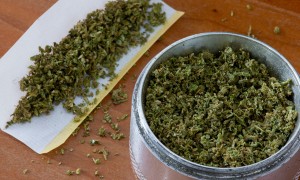 The drug is currently listed under “schedule 1,” the most restrictive class of drugs controlled by federal law. The government considers cannabis, heroin, LSD, and other drugs on this list so dangerous and addictive they are banned for any use, including medical.
The drug is currently listed under “schedule 1,” the most restrictive class of drugs controlled by federal law. The government considers cannabis, heroin, LSD, and other drugs on this list so dangerous and addictive they are banned for any use, including medical.
Reformers have pushed for decades to move marijuana to a lower schedule so it can be better researched and made available for medical use across the country. More than two dozen states have legalized the drug as medicine under their laws, while four have made it legal for any adult use, but because of its listing on schedule 1, the federal government could force those states to prohibit it again.
Facilitating research into marijuana’s benefits
Moving marijuana to schedule 2, as many reformers have suggested, would protect states that legalize it and make it easier for scientists to study its benefits. But only Congress and the DEA can make that change.
Congress has repeatedly balked at doing so, and the DEA has even less impetus to act. A letter announcing the agency’s plan to decide soon didn’t say which way it might rule, but if history is any guide, rescheduling is extremely unlikely.
The letter was a response to a request by Massachusetts Sen. Elizabeth Warren and seven other senators who pushed the Obama administration to reclassify cannabis. That request was made in a 2015 letter to the DEA.
DEA has repeatedly opposed rescheduling cannabis
Legalization advocates have long pushed the DEA to reschedule marijuana, but the agency has repeatedly refused. President Barack Obama has demurred on the issue, saying the decision should lie with Congress, not the DEA or Department of Justice.
“(The) DEA understands the widespread interest in the prompt resolution to these petitions and hopes to release its determination in the first half of 2016,” the agency said in its letter.
DEA Administrator Chuck Rosenberg, who was appointed last year following a massive agency scandal, used the letter to explain the government’s control of the only federally legal marijuana supply, grown at the University of Mississippi for highly restricted research.
Awaiting a recommendation from the FDA
 The final decision will rest in part on a recommendation from the FDA, which has reviewed medical evidence regarding the drug and sent its conclusions to the DEA, Rosenberg said. He didn’t tell the senators what the FDA recommended.
The final decision will rest in part on a recommendation from the FDA, which has reviewed medical evidence regarding the drug and sent its conclusions to the DEA, Rosenberg said. He didn’t tell the senators what the FDA recommended.
But he said the DEA would consider providing more federal cannabis to scientists if research needs were to exceed the supply in Mississippi. That might only mean a few new growers, not rescheduling.
Most recently in 2001 and 2006, the DEA rejected petitions to reclassify the substance. But neither of those requests came from U.S. senators.
The senators behind the new request, with the exception of Warren, have sponsored a bill that would make it much harder for federal agencies to block state-level legalization of marijuana. The legislation would also encourage more research.
“Almost half the states in the country have medical cannabis laws, and major groups like the American Nurses Association and the American College of Physicians are on board,” said Tom Angell of the Marijuana Majority. The administration, Angell said, should reschedule the drug “before this president leaves office.”
Will DEA Reschedule Marijuana? No, Probably Not
Sunday, May 1, 2016
Racial Disparity Persists in D.C. Marijuana Arrests
When residents of Washington, D.C., voted to legalize marijuana in 2014, they had more than a few reasons. But one stood out from the rest: wiping out racial disparities in drug arrests.
 The overall number of cannabis-related arrests has dropped sharply in the months since, but the glaring divide remains. The statistics have changed, but the racial reality behind them has not.
The overall number of cannabis-related arrests has dropped sharply in the months since, but the glaring divide remains. The statistics have changed, but the racial reality behind them has not.
Before the vote, black District residents accounted for 9 in 10 arrests on charges of simple drug possession. As a result, racial minorities charged with marijuana offenses were long over-represented in the city’s jails. They still are.
District police still disproportionately arrest blacks
According to arrest data published by The Washington Post in April, black people make up the vast majority of those who face marijuana charges, far more than their proportion of the District’s population would suggest. The District is roughly half black, while whites make up less than 40 percent.
The greatest disparity may be in arrests for smoking in public, a misdemeanor punishable by up to 90 days in jail and a $500 fine. The charge is essentially the same as that for carrying an open container of alcohol in public.
Of 128 arrests for public marijuana use in 2015, 108 were targeted at black people, the Post reported. The newspaper got its data from the Drug Policy Alliance, which got them from the city’s Metropolitan Police.
District Council votes to ban members-only cannabis clubs
The report came at roughly the same time as a vote by the District Council to permanently ban members-only cannabis clubs and other forms of public use. The 7-6 vote reversed two earlier decisions by the council, though a second, final vote is required within the next few weeks.
Allowing the clubs would likely have reduced the continuing racial disparity in arrests, and would have followed the lead of Denver and other cities that could soon permit them. The clubs would have made life easier for local marijuana users, especially low-income residents barred from smoking in public housing. Those residents are disproportionately black.
Cannabis clubs would reduce public consumption
 Though cannabis clubs would be treated as public spaces, allowing them would likely cut down on other public use dramatically. Public use charges are especially concerning for people who have nowhere to use except their cars, while driving.
Though cannabis clubs would be treated as public spaces, allowing them would likely cut down on other public use dramatically. Public use charges are especially concerning for people who have nowhere to use except their cars, while driving.
The racial gap reported by the Post is troubling, but it doesn’t call the effectiveness of legalization into doubt. Fewer people are going to jail overall, and that means fewer black people are going to jail.
Still, the numbers are disturbing. They suggest racial problems in the city and its criminal justice system go much deeper than cannabis policy, especially considering the large disparity in other drug-related arrests.
If the District Council were to allow pot clubs, the disparity might shrink. But it likely would have persisted in other marijuana crimes, such as misdemeanor possession over the legal limit, commercial cultivation, and sales. Retail cannabis stores are prohibited in Washington under federal rules passed by Republicans in Congress.
Racial Disparity Persists in D.C. Marijuana Arrests
D.C. Bans Cannabis Clubs
Marijuana tokers in Washington, D.C., got some bad news in April, as District officials moved to permanently ban any use of the drug in public – including at members-only cannabis clubs.
 The vote by the District Council on April 5 was a complete turnaround from council members’ previous stance on the issue, though it won’t be decided for good until a final vote in a matter of weeks.
The vote by the District Council on April 5 was a complete turnaround from council members’ previous stance on the issue, though it won’t be decided for good until a final vote in a matter of weeks.
The council vote was 7-6, a disappointing outcome for marijuana users and drug-policy reformers in the nation’s capital. It was a direct reversal of earlier votes in favor of cannabis clubs.
One of those votes, in February, created a task force to study whether the Distruct should start licensing members-only clubs. These pot bars, which have been discussed in other places where marijuana is legal for recreation, would allow only private members and would require them to bring their own supply; cannabis or alcohol sales would be prohibited.
Previous vote showed strong support for allowing private clubs
The February vote was unanimous, suggesting to many that the council would ultimately allow the clubs, and possibly other forms of public marijuana use. It is currently a misdemeanor to toke in public, while carrying or using the drug on federal property comes with particularly harsh penalties.
District voters legalized all adult cannabis possession and use in November 2014, and the policy took effect in 2015. It is now legal to possess small amounts of the drug and use it on private property. But retail pot shops remain illegal in the city under federal law.
Cannabis is also legal for recreational use in Colorado, Washington, Oregon, and Alaska. Commercial sales are allowed in those places, but as of yet, cannabis clubs are not.
Increasing public marijuana use since legalization
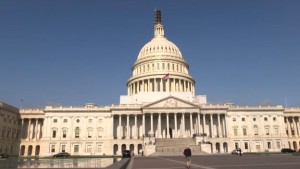 Public use of the drug has increased in the District since legalization took effect and marijuana arrests plummeted across the city. But as in other places, the ban on smoking in public has created problems for many users.
Public use of the drug has increased in the District since legalization took effect and marijuana arrests plummeted across the city. But as in other places, the ban on smoking in public has created problems for many users.
Landlords and other property managers often ban smoking even in private settings such as apartments. This leaves tokers, especially tourists, with nowhere to use. Many smoke in their cars, while driving, which is illegal.
District officials didn’t explain the rationale behind the new vote after it was cast.
Another earlier vote would have let the public smoking ban expire, but council members later reversed course under pressure from District Mayor Muriel Bowser. The April vote marked the second turnaround for the council on the marijuana issue.
Reform advocates complained that the task force was never allowed to do its job. Kate Bell, legislative analyst for the Marijuana Policy Project, said the most recent decision defies the will of District residents.
“We are very disappointed that the council voted to permanently impose this unnecessary ban on the freedoms that the vast majority of the voters support,” Bell said.
D.C. Bans Cannabis Clubs
Dog Brings Her Owner a Trophy: Marijuana
As the old saying goes: “When a dog bites a man, that is not news. When a man bites a dog, that is news.” So what about when a man leaves marijuana out in the open and a dog brings it home?
Police in Laurel, Miss., were stumped in March when a black lab mix named Miley brought her owner a bag full of cannabis she found – somewhere – while looking for a place to pee. So stumped they didn’t even know where to begin.
Miley, whose owner wasn’t identified by police, apparently left home in search of a quiet spot to relieve herself. Somewhere along the way, she came across a white plastic bag full of cannabis. Perhaps thinking it was the morning paper, or a pair of slippers, or maybe just a bone, she brought it home to her master.
1lb of marijuana
The marijuana weighed roughly a pound, according to the Jones County, Miss., Sheriff’s Office. Officials there couldn’t say exactly how much it would be worth on the street, but it was doubtless a big loss for the dealer who left it sitting around unattended.
Miley’s owner called the sheriff’s office immediately after discovering her big prize Mar. 26. Investigators looked inside the bag and found several ounces of high-grade marijuana stuffed inside multiple plastic baggies, rolled up in stick-like shapes similar to the Thai Stick strain.
The white bag also contained baggies full of lower-grade weed, said sheriff’s spokeswoman Allyson Knotts. As of Mar. 30, there were no arrests and no apparent leads, Knotts said.
“They can’t really ask the dog, ‘From what pile did you get that?’” she said. “It’s under investigation, but it was a tricky incident.”

Dog’s owner not suspected of a crime
Miley’s owner was not suspected of any crime and was not under investigation, Knotts said. Laurel, Miss., is a small community located about 30 miles north of Hattiesburg in the southern part of the state.
Though bizarre, this sort of thing is not especially surprising. Marijuana dealers are no less prone to stupidity than anyone else, and sometimes much more so. The annals of cannabis news are littered with reports of less-than-brilliant traffickers who mailed pot to the wrong address or left it sitting around in full public view.
It’s anyone’s guess what led Miley to bring home her trophy. The more remarkable thing, as in most such cases, is that her owner called the police at all.
—
Tell us: Would you turn in a pound of weed if your dog brought it home? What do you think happened to the dealer who left it behind?
Dog Brings Her Owner a Trophy: Marijuana
Friday, April 29, 2016
Toking in Front of the White House? It"s for a Cause
Willie Nelson says he smoked a joint on the roof of the White House. Snoop Dogg claims he toked in a bathroom not far from the Oval Office.
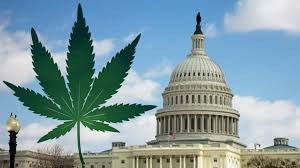 Protestors pushing for real legalization in Washington, D.C., didn’t get quite that far in April, but they did show up at 1600 Pennsylvania Avenue to spark up and make a point: It is taking far too long for the Obama administration to let the voters’ will take effect.
Protestors pushing for real legalization in Washington, D.C., didn’t get quite that far in April, but they did show up at 1600 Pennsylvania Avenue to spark up and make a point: It is taking far too long for the Obama administration to let the voters’ will take effect.
District voters legalized marijuana in 2014, and it’s safe to possess and use small amounts in the city. But nary a pot shop has opened, and protestors feel Obama is largely to blame.
The burn-out, scheduled for April 2, was put together as a way to make the city’s frustration clear. Participants planned to show up, light up, and get themselves arrested in front of the White House.
And they planned to come in style. In the days before the rally, artist Adam Eidinger was building a 51-foot inflatable joint to bring to the park across the street from the president’s residence. Eidinger hoped to put a fan inside it to blow cannabis smoke across the crowd. If that fails, he said, protesters could simply step inside the balloon, fill it with smoke, and seal it up.
Pressuring Obama and Congress to act
Eidinger is head of the D.C. Cannabis Campaign, and his goal is to pressure Obama and Congress into removing the final obstacles that make full legalization impossible in the District. Protesters also hope to take a subtle dig at D.C.’s lack of statehood.
In a broader sense, Eidinger said, he wants to make a point about the 5 million cannabis arrests that have occurred since Obama took office. And he wants the president to remove the drug from schedule 1 of the Controlled Substances Act – a list that includes dangerous drugs such as heroin and synthetic THC.
“Obama, he smokes, maybe not now, but he did smoke,” Eidinger said. “So for him to oversee an enforcement regime that has arrested 5 million people for marijuana . . . I’m very motivated because I think it’s a discriminatory practice.”
Eidinger, like many of the protesters, backs Vermont Sen. Bernie Sanders in the Democratic primaries. Sanders favors full legalization, while front-runner Hillary Clinton says the country needs more time. But if Clinton wins, as expected, action by Obama now could give her political cover to do the right thing, Eidinger said.
“If Obama really wants to help Hillary, he’ll do this,” Eidinger said. “Because people like me, who are strong Bernie supporters, we would feel more comfortable supporting the Democratic candidate if this is underway.”
Eidinger’s protest did not draw support from major marijuana lobbying groups
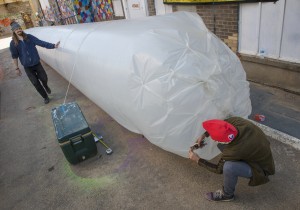
Eidinger’s protest drew plenty of attention, but not the support of national pro-pot lobbying groups.
“We’re not involved, and we don’t think that consuming marijuana on federal property is an appropriate way to promote reform,” said Kaitlyn Boecker, spokeswoman for the Drug Policy Alliance.
Tom Angell, head of the Marijuana Majority, agreed.
“Smoking marijuana outside the president’s house, around tourists and kids, is probably not a good way to get the president to do what you want,” Angell said.
—
Post a comment and let us know: Was it a smart idea to toke outside the White House? Could this sort of protest backfire and hurt the cause?
Toking in Front of the White House? It"s for a Cause